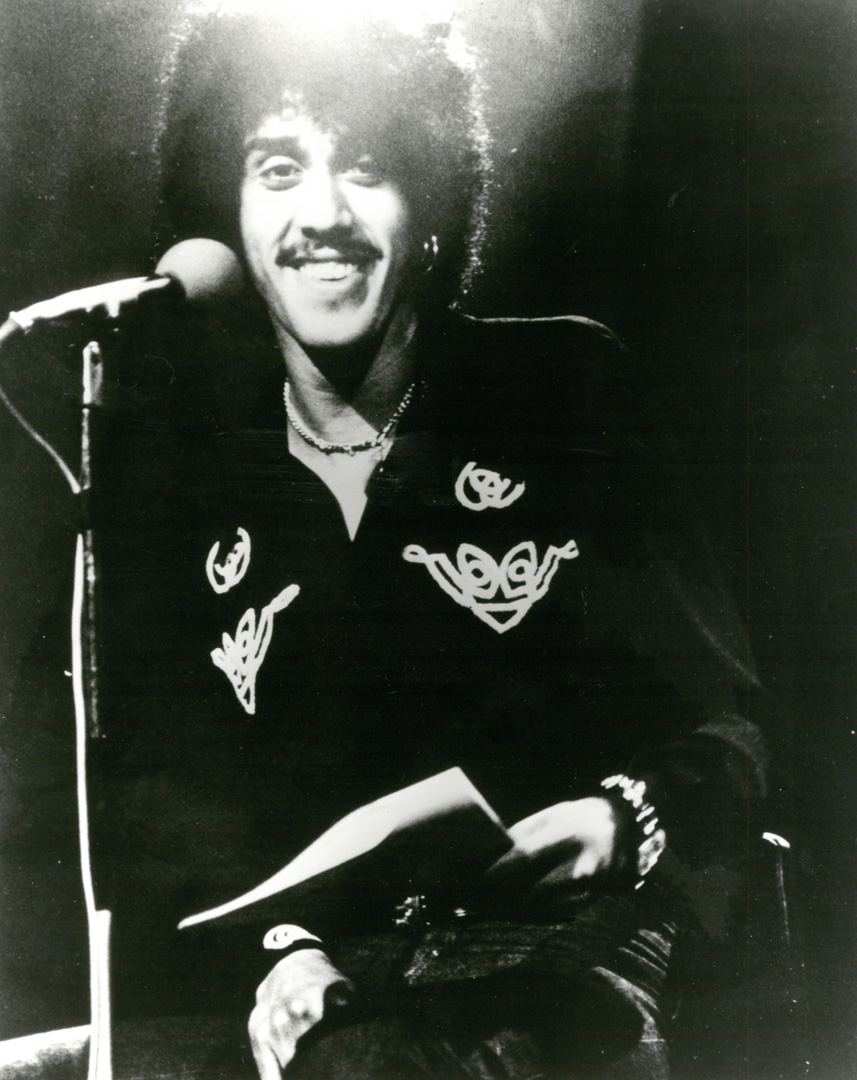- Music
- 18 Apr 24

On April 18, 1980, Thin Lizzy's Philip Lynott released his debut solo album, Solo in Soho. Featuring appearances from Mark Knopfler, Huey Lewis, Midge Ure, Gary Moore, Scott Gorham, Brian Downey, Snowy White, and more, the album – produced with Kit Woolven – featured singles like 'Yellow Pearl' and 'King's Call'. To mark the occasion, we're revisiting our original album review, penned by the late Bill Graham.
Originally published in Hot Press in 1980:
Exactly where Solo in Soho fits into the Lynott/Lizzy collected works won't be apparent till they've finished their own drive to '81. Certainly this isn't an indulgent album of loose skeleton tunes from the lowest drawer in the cupboard, as Philip Lynott eschews past impassioned tactics to show that he too can be a cool craftsman. Often it works, sometimes it leaves you puzzling over the missing ingredient. It's definitely a poser!
This solo album has been threatened for three years now. There's often been the hint that Lynott's musical personality couldn't be limited within the confines of Lizzy, one of the saddest but earliest examples being 'Randolph's Tango', the brilliantly constructed but tragically dismissed follow-up to 'Whiskey In The Jar'. And if Lizzy have been meeting increasing fire for the conservatism of their stage set, a key document to understanding both Lynott's impatience with the critics and Solo in Soho may be a Melody Maker interview of last year wherein the man confided about his experimentation with synthesizers in association with Midge Ure. Solo in Soho is anything but a guitar album and thereby Lynott is requesting his fans keep their wits about them.

Smoky, indeed often murky, in its atmosphere – think pink and grey – it's one from Mr. Bassman, the same four-string principles sometimes connecting to the synths. Solo in Soho also finds Lynott exploring other rhythms of black music, be it disco, reggae, r n' b, Motown and even calypso. And talking of rhythm machines, tip the hat to Brian Downey, who on six of the ten tracks displays, without qualification, his ability to deal from any pack.
Advertisement
With Lizzy, Lynott was the cool centre of the thunderstorm, the sleepy lion, sometimes purring, sometimes growling but always likely to bite and roar. But now he's gambled by dispensing with the counterpoint of flashing lightning guitars. When Solo in Soho is unsatisfying, it's when he hasn't found a substitute. Solo in Soho is a venturesome sound worth due respect; it's the sense that sometimes doesn't match it. The lyrics are often too casual to give the album the extra substance it requires.
(And don't instantly put 'A Child's Lullaby' into that category. It may not be deep but it's a heartfelt ballad to his daughter and if you can't allow yourself such endearments to young charms on a solo album, what's the opportunity worth?)
Sound and sense match perfectly on 'Ode To A Black Man'. True, in its redecorated rhythm n' blues it may be the closest song to Lizzy, but the song will be automatically and unanimously accepted into the canon as Lynott cuts across with his conviction that black music, both American and Jamaican, has fallen prey to complacency. It isn't just a matter of belief – Lynott presumably must believe the rest of his lyrics – rather that the lyrics are so forcefully direct and specific as to leave nobody with any doubt about his sentiments. I'd love to (kiss of death!) see it be an American hit.
'King's Call' with Mark Knopfler in attendance is equally specific, this time about fallen heroes – in this case Elvis Presley – and also revises traditional forms with Knopfler's guitar submerged to relocate the habitual D.S. groove. Again it vindicates the Downey- Lynott versatility.
'Tattoo' also will surprise, Lynott, Downey and Gorham amalgamating with the harp of Huey Lewis and Fiachra Trench's brass and string arrangements to threaten the Jackson 5's turf with a cute song.
That trio of songs easily merit inclusion but it's with 'Girls' and 'Yellow Pearl' atop side two that Solo in Soho is most experimental. The latter is obviously about some sort of threat – but with its opaque lyrics, it's hard to espy exactly what. However you can forget such incidentals, as Lynott and Ure's take-off of the Yellow Magic Orchestra works playfully on mood. A Lynott disco track? Yes – and do not be distressed!
Advertisement
'Girls' is a more complex and adventurous combination of pop and moderne principles. It starts gloriously – something like Randy Newman's 'Jolly Coppers On Parade' meeting the Beach Boys where Brian Wilson should be – moves on to a girls talk-over but somewhere along the line it gets over-excited. More rigorously contained it could have been a classic, but as it goes on the girls over-adorning talk starts to cloy.
Solo in Soho is simultaneously satisfying and frustrating. Strong on sound presence and performance, it shows Lynott's capacity to cope with forms outside the usual Lizzy format and is also the most groovalistic work he's ever done. But too often the lyrics are lax, being neither specific or glacially obscure and symbolic enough for the various tasks in hand. He's too often trapped within his own charisma, his own ideal of himself as a Romeo.
Where Solo in Soho will lead Lizzy and Lynott, we'll all have to find out. It certainly could fall victim to disturbing the band's more conservative fans whilst being over-speedily dismissed by the trendsmiths. Uneasy as Solo in Soho sometimes is, the album deserves neither fate. Will its new directions be further refined? I hope so – whatever the context. Philip Lynott definitely should not be put back in his box.










